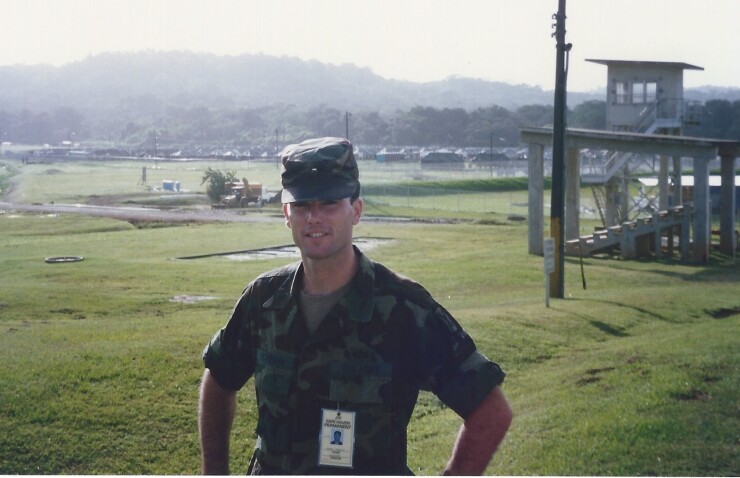Veterans Day 2022: The transition from military service to financial services

McKenna said he always had a strong sense of service, even when he was in elementary school.
“Instead of wanting to be student body president, I was Key Club president,” he said. “And I loved a lot of things about the military, but I was really interested in the service side of it.”
The son of a mother who worked as a mail carrier for more than 30 years, McKenna said he grew up with a very middle-class experience — one supported by the hard work of his mother.
He wanted to make her, and everyone else who supported him, proud. So he dedicated himself to becoming the first in his family to get a higher education after finishing high school.
“I looked at different ways to get there, and the service academy really felt like a fit for me. But I’m an only child, and my mom said to me, ‘you know.’ It would be great if you can stay in California and stay closer to home,” he said. “She and I started talking about (Army) ROTC and when I looked into it, it actually seemed like a really good fit because I can fulfill that interest in military service and get a scholarship and go to college in California.”
That decision led to an ROTC scholarship that landed him at the University of Southern California, close enough for his mother to drop by but far enough to establish his own independence.
As an undergraduate, McKenna majored in accounting. He knew he wanted a skill that would allow him to always put food on the table, but also allow him to learn the language of business.
His time at USC ended with him as a Distinguished Military Graduate, a designation awarded to the top-ranking ROTC students. McKenna met that honor with great excitement because it meant he was more likely to be selected for active duty.
With an interest in technology, he kept an extremely busy schedule for the next four years. He was a Signal Corps officer specializing in cyber command at Fort Gordon in Georgia. Then he went to airborne school to learn how to jump out of planes. He then went to Alaska for warfare and survival training. He then went to Korea to work in military intelligence as a signal corps officer handling technology operations for his intelligence group.
“From there I went down to Panama. I went to language school to learn Spanish and eventually I ended up working for General Barry McCaffrey, who was the commander in chief of US forces in South America. So I spent about a year and a half work on a four-star general staff as a very junior officer … an incredible experience,” McKenna said. That experience would grow into him working in a Cuban refugee camp in the early 90s, helping Cubans get to the United States.
“I ran this thing called the Family Support Center, which was one of the most heartfelt things I did in the military. It was reuniting Cuban families from all over the world with the Cubans who fled the tyranny of Castro’s Cuba,” he said. “There was this wonderful connection between service and humanity and people trying to do the best with their lives. So my four years in the military were just wonderful.”
With so many fluctuating and changing responsibilities in just four years, McKenna relied on his military training to stay disciplined. He was given responsibilities beyond that of an average 20-something college graduate.
Now an Army lieutenant, McKenna followed his time in the service with graduate school at Georgetown University when he developed a strong interest in investment banking, gaining a formal entry into Wall Street with the help of JP Morgan.

The years that followed were as action-packed as his four years in the Army, and included co-founding four businesses, two investment funds and a non-profit organization.
“There were definitely a lot of things that I was probably inexperienced in. But that’s another thing about military service. You’re adaptable and have a natural entrepreneurial orientation. And you just want to spend the hours figuring out how to accomplish the goal,” McKenna said . “And then another cool thing was that there were other veterans in my class and a few others around the bank and we had a way of just finding each other. The military network is very strong and people are willing to help each other. So I was able to jump into a very high-level Wall Street job with my military experience and a couple of years of graduate school.”
Today, as one of Facet’s leaders, McKenna upholds his military values and is quick to put others first. He said he harkens back to making his mother proud and wants to provide opportunities for other small-town kids who want to make an impact.
So when he thinks about the term “financial services”, he focuses more on the second word than the first.
“My mom worked hard. It was a very good upbringing. But we certainly didn’t have anyone on our side when we thought about financial decisions,” McKenna said. “Everybody was a transaction. A mortgage. Or a credit card. Or a bank loan. Everything is a transaction, not a relationship. And as I learned more I said, ‘what does it take to get what I get as a high net worth person and offer it in the same way, but at the right price, to a larger market? And frankly, that’s the foundation of Facet.”






















